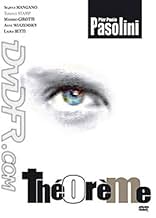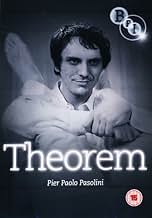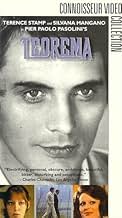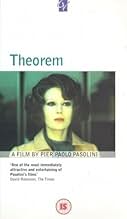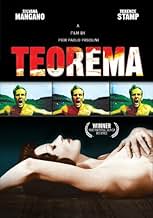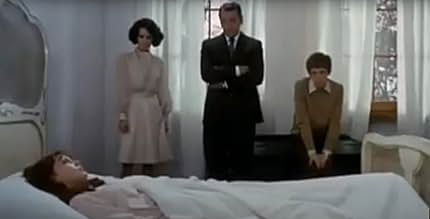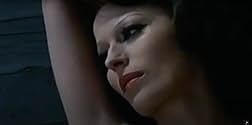A mysterious young man seduces each member of a bourgeois family. When he suddenly leaves, how will their lives change?A mysterious young man seduces each member of a bourgeois family. When he suddenly leaves, how will their lives change?A mysterious young man seduces each member of a bourgeois family. When he suddenly leaves, how will their lives change?
- Director
- Writer
- Stars
- Awards
- 1 win & 5 nominations total
- Second Boy
- (as Ivan Scratuglia)
- Interviewer
- (uncredited)
- Old Peasant
- (uncredited)
- Director
- Writer
- All cast & crew
- Production, box office & more at IMDbPro
Featured reviews
In the jump between the main story and the prologue a motif, {repeated throughout the entire movie}, of the Hebrews wandering in the wilderness, hoping to find the Promised Land, is inserted
We are introduced to the nuclear family in its bourgeois construct as an Industrialist with huge factories and a magnificent Milanese villa, his trophy wife, a beautiful female, sybaritic, vacuous and fashionably attired and coiffured, as befits her class, their son Pietro and daughter Odetta. All of them are illustrated as typically bourgeois, self-satisfied and complacently entitled to lead their lives empty of meaning. All bourgeois households of their class have servants and the religious peasant Amelia runs their household.
Pasolini then has a metamorphic agent, the boyish Terence Stamp, enter into their idyll. A cypher for the creative force of the auteur Pasolini himself, "the boy" insinuates himself into the individual lives of each of the five personae in the household. First, for no explicable reason other than the sexiness of his appearance, {Pasolini's homosexuality focuses on Stamp's prettiness and young slender physique}. Stamp's personality is quite reserved and introverted, so although he is seen to be reading the iconic gay poet Rimbaud, and playing the fool in a boyish way, we are never quite convinced of any intellectual passion.
The five seductions are all carnal, starting with the peasant Amelia, who is overwhelmed by Stamp's "aura" and, initially trying to avoid her "fall" by attempting suicide, succumbs to her desire for sexual congress with "the boy". In quick succession "the boy" inducts the younger son into the homosexual life. Here the thought occurs that a typical initiation into homosexuality by the older man would most likely be Pasolini's personal narrative, especially, as the story develops we see the son overcome his anguish by sublimating into the arts, as Pasolini himself, did. Next "the boy" is seduced by the mother and then the daughter pulls him into the bedroom. Finally the heterosexual father {in a typical gay fantasy "all straight men are potentially gay" } is seduced by "the boy". Having performed his role of alchemical mischief we are introduced to Tolstoy's novella "The Death Of Ivan Ilyich" when as if enacting the final chapter, the father falls ill and "the boy' takes his legs and holds them above his head giving him relief - it should be noted that Nabakov lectured on this work stating that Tolstoy considered bourgeois hypocrisy to be a moral death or suicide of the soul.
Then, suddenly "the boy" - the revolutionary agent of transformation - announces his abrupt departure {this takes place almost exactly half way into the movie}. Like the aftermath of a bad L.S.D. trip, {Pasolini created this movie in 1967 at the height of the 60's revolution}, the confusion and dismay of the five individuals are the necessary results of picking up the pieces, and living a life with new values, and the meaninglessness of the past.
Of the five the most personal is the son Pietro, who leaves home to take the path of the artist {Rimbaud's calling} and become a painter {deeply inspired by a coffee table art book of Francis Bacon}. He muses that now that his past delusions of normality were shattered by his realization of his homosexuality, he must embrace his difference and become a creative power himself. He becomes a painter and paints on glass reminiscent of Duchamp's "Bride Stripped Bare" - he goes through many changes and humiliations, eventually restoring his equilibrium and health, by realizing the inconsequence of his life in relation to the universe. Here you have Pasolini's personal odyssey integrated into the story.
As to the other players, Amelia the servant returns to her country roots, where she becomes an austere penitent, and performs the Catholic miracle of levitation, only to be buried by an old peasant woman {played by Pasolini's mother} and once again with reference to Tolstoy's "Death of Ivan Ilyich" she declares that she is not dying but acting out of sympathy for those that are still living in moral death, aka the bourgeoisie. The mother in true homosexual style becomes a woman driven to find young boys { as in gay "cottaging", rent-boys, etc,}, and has anonymous sex with them. We leave her in a state of ungratified anguish. Odetta, the daughter {described by her mother as "caught up in the Cult of Family"}, allows her life force to seep away, while the father gives away his factories, and strips himself naked, ending up like his wife, wandering in the wilderness with no hope of finding the Promised Land.
Another peculiarity of this beautifully framed cinema is Pasolini's gay framing of the male crotch which is in contrast to the usual Hollywood focus on the female mammary, buttocks and legs. There is also some clothing fetishism with the camera lovingly gazing at the male Y-fronts. {underpants}
At the end of the explication of a theorem "Q.E.D." is affixed "that which has been demonstrated". I recommend this movie to those that are interested in the art of the 60's, gay art, revolutionary politics, and Surrealism in cinema. Its a mind blowing experience!
Did you know
- TriviaAt the 1968 Venice Film Festival, the film was given an award by the International Catholic Film Office. The award was withdrawn after critical remarks by Pope Paul VI. After the festival the film was confiscated by Italian police and Pier Paolo Pasolini charged with obscenity, but acquitted.
- GoofsWhen Lucia (the mother) leaves the house to go cruising for men, she is wearing a white coat. The first camera shots of her in the car also show the coat. However when she spots a young man and stops the car, the white coat is gone and now she's wearing a dark orange coat.
- Quotes
Lucia, the mother: I realize now that I've never had any real interest in anything. I don't mean anything grand. Just the simple, everyday interest my husband takes in his work, or my son in his studies, or Odetta in family life. I've had nothing like that. I don't know how I lived with such emptiness, yet I did. If there was anything at all, some instinctive love of life, it has withering away - like a garden where no one ever goes. Actually, that void was filled with false and wretched values, an appalling jumble of misguided ideas. Now I see: You filled my life with a real and total interest. So by leaving, you're not destroying anything that was there before, except my chaste bourgeois reputation. Who cares about that?
- ConnectionsEdited into Histoire(s) du cinéma: Seul le cinéma (1994)
- SoundtracksRequiem
KV 626
Written by Wolfgang Amadeus Mozart
Performed by Russian Academy Choir and Moscow Philharmonic Orchestra
Courtesy of MK Records
- How long is Teorema?Powered by Alexa
Details
- Runtime
- 1h 38m(98 min)
- Color
- Aspect ratio
- 1.85 : 1



